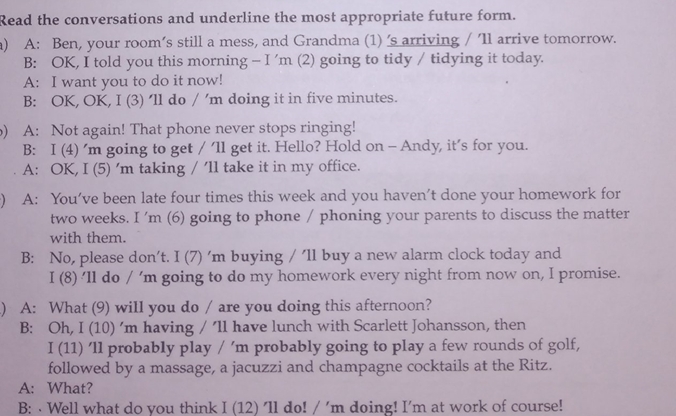Futuro en ingles – Repaso Going to, Will, Present Continuous para futuro – LECCION 73
Repaso del futuro en INGLES / LECCION 73 GRAMMAR – GRAMATICA
Bienvenidos a InglesTotal,
LECCION CON AUDIO: Click en el ícono de PLAY en el reproductor
Podcast: Download
Subscribe: Apple Podcasts | Spotify | TuneIn | RSS
Saludos a todos nuestros alumnos virtuales y a nuestros visitantes. Hoy les traemos una lección de repaso en donde hablaremos de las diversas formas de hablar del futuro que hemos visto usando el Present Continuous, Going to y Will. Esta lección es un aporte una compañera que ya anteriormente nos trajo una lección. Miriam Espinoza colaboro con la clase escrita a esta lección y yo con la clase en audio además de algunas recomendaciones. Recuerden de no perderse ninguna de nuestras publicaciones siguiéndonos por Facebook y Twitter. Si usted tambien quiere colaborar o hacer una clase mande un email a contacto@inglestotal.com
Usos en inglés:
Will (‘ll), (be) going to and Present continuous are three common forms used to talk about the future. Each one tells you something different about what happened at, or before, the momento of speaking.
No olviden de visitar las siguientes lecciones donde hemos visto otros usos:
LECCION 36: Future with WILL – Tiempo Futuro
LECCION 37: Diferencias entre GOING TO y WILL
LECCION 51: Present Continuous FUTURE
Will (‘ll):
You cam use will (‘ll) to show that the future in the result of a spontaneous decisión made at the momento of speaking or for talking about things we things we think will happen with no specic plan or arrangement.
 I’ll talk to the head teacher tomorrow. (The head teacher doesn’t know about this. I have made my decision to talk to him While I have been speaking).
I’ll talk to the head teacher tomorrow. (The head teacher doesn’t know about this. I have made my decision to talk to him While I have been speaking).
What will you do after university? (My assumption is that you haven’t thought about this much before or that you haven´t made any plans).
Will/Shall has several different functional uses:
- Offers: Shall I give you a lift?
- Promises: Don’t worry. I won’t tell anyone.
- Suggestions: Shall we sit by the window?
- Will can also be used to make predictions: I think we’ll arrive at about 10 pm
Actividad extra: WILL NO SIEMPRE ES FUTURO (con audio)
(Be) going to:
You can use (be) going to, to talk about your future plan sor intentions. You have made a decision about a future event and you are talking about that decision.

I’m going to talk to the head teacher tomorrow. (The head teacher does not necessarily know about this yet. But I have thought about it and I intend to talk to him).
What are you going to do after university? (My assumption is that you have thought about it and may have some plans).
(be) going to is also used to make predictions base don present evidence.
It’s going to rain. (There are lots of black clouds in the sky.)
She’s going to win. (She is 100 metres ahead of all the other runners.)
Actividad Extra: HABLAR DE FUTURO IMMEDIATO (con audio)
Present continuous:
You can use the present continuous to talk about future arrangement. You have arranged a future event and you are talking about that arrangement.

EXERCISES
1.

2.

3.




Gracias profesor Carlos por estas clases y su disposición de tiempo para realizarlas de modo gratuito, hace un año estoy en una academia de inglés pero sigo sus clases a la par para despejar dudas y realmente es interesante, en días pasados expuse una clase guiándome por sus recomendaciones y errores comunes y realmente fue muy motivante ayudar a mis compañeros de academia. Un abrazo desde Cali Colombia..
Estaría muy bueno que en lugar de seguir avanzando puedas pasar a AUDIO las lecciones que aún no lo tienen, los que estudiamos a través del audio porque no podemos hacerlo de otra forma es una muy buena forma de ir aprendiendo el idioma.
Muchas gracias por tu generosidad en poner estas clases gratuitas para que todos podamos acceder!!!